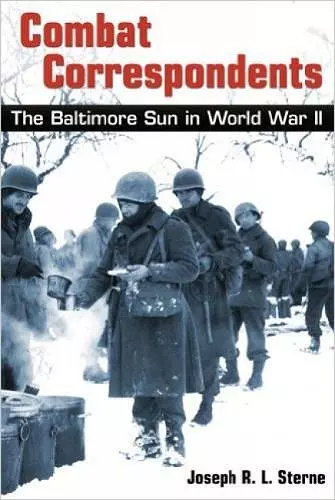Combat Correspondents – The Baltimore Sun in World War II
Format:Paperback
Publisher:Maryland Historical Society
Published:27th Sep '11
Currently unavailable, and unfortunately no date known when it will be back

This is good, old-fashioned, newspaper journalism at its very best: war reporting as it should be, written on the front lines by a half dozen literate, brave, and elegant correspondents of The Baltimore Sun. Readers who missed World War II will sense the thrill of being alive when the whole world was on fire; those who were there may look back in wonder. -- Russell Baker, former Baltimore Sun reporter and London Bureau Chief; later New York Times reporter and columnist 2009
Their dispatches, which reported the war with the immediacy of real time, make up the core of this book.The Baltimore Sun covered World War II with an outstanding team of combat correspondents, among them three future Pulitzer Prize winners. The correspondents witnessed momentous events: Anzio and Cassino, D-Day, Black Christmas in the Bulge, the crossing of the Rhine, the link up with the Russians on the Elbe, the German surrender at Rheims, the invasions of Iwo Jima and Okinawa, and the Japanese surrender on the U.S.S. Missouri. They took enormous risks. Price Day was in action at Anzio and Cassino; Holbrook Bradley landed with the 29th Division on the Normandy beaches. Lee McCardell narrowly escaped death when a bomb exploded near his jeep. Howard Norton was on a sub chaser when a Japanese shell killed most of its crew. Philip Heisler's escort carrier nearly capsized in a typhoon. They filed stories from the front lines of history. Norton scooped the world on the execution of Mussolini. Day and McCardell were among the first to file stories on Nazi atrocities and death camps. The doyen of these correspondents, Mark Watson, wrote prescient articles on military strategy. All of them sent back gritty stories of the endurance and humor of ordinary GIs. This was a time when correspondents wore uniforms, censors could block their stories, and journalists wrote on portable typewriters and traveled dozens of miles to file their copy. Enjoying a personal freedom of movement and decision-making unknown in today's electronic era, these newspaper men were working at a time when print journalism was the prime medium for news. Their dispatches, which reported the war with the immediacy of real time, make up the core of this book.
Sterne celebrates them, but without nostalgia... The correspondents' total iimmersion in their world imbues their reports with emotional dimensions. -- Michae Sragow Baltimore Sun 2009 More than the quality of the reporting itself, the reader will be struck by the changes in technology-driven communication over the span of nearly 70 years. -- Steve Goddard History Wire - Where the Past Comes Alive 2009 The quality of the narratives included here, and Sterne's historical comments on them, will cause readers to wonder why no other historian has taken up the subject in the last sixty-five years. -- Stacy Spaulding Jhistory, H-Net Reviews 2010
ISBN: 9780938420149
Dimensions: 228mm x 153mm x 20mm
Weight: 458g
256 pages